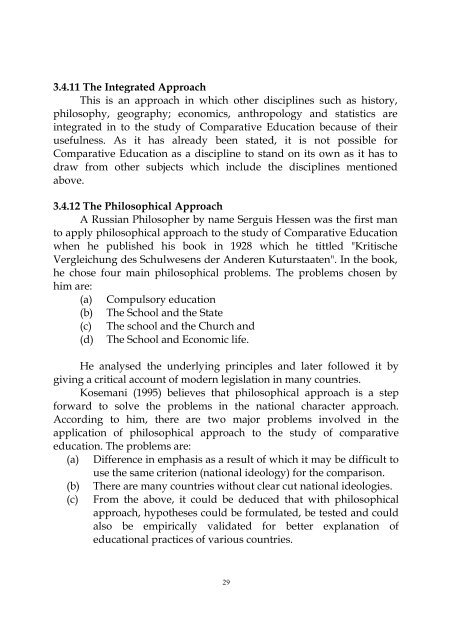edu 304 - comparative education - National Open University of Nigeria
edu 304 - comparative education - National Open University of Nigeria
edu 304 - comparative education - National Open University of Nigeria
You also want an ePaper? Increase the reach of your titles
YUMPU automatically turns print PDFs into web optimized ePapers that Google loves.
3.4.11 The Integrated Approach<br />
This is an approach in which other disciplines such as history,<br />
philosophy, geography; economics, anthropology and statistics are<br />
integrated in to the study <strong>of</strong> Comparative Education because <strong>of</strong> their<br />
usefulness. As it has already been stated, it is not possible for<br />
Comparative Education as a discipline to stand on its own as it has to<br />
draw from other subjects which include the disciplines mentioned<br />
above.<br />
3.4.12 The Philosophical Approach<br />
A Russian Philosopher by name Serguis Hessen was the first man<br />
to apply philosophical approach to the study <strong>of</strong> Comparative Education<br />
when he published his book in 1928 which he tittled "Kritische<br />
Vergleichung des Schulwesens der Anderen Kuturstaaten". In the book,<br />
he chose four main philosophical problems. The problems chosen by<br />
him are:<br />
(a) Compulsory <strong>edu</strong>cation<br />
(b) The School and the State<br />
(c) The school and the Church and<br />
(d) The School and Economic life.<br />
He analysed the underlying principles and later followed it by<br />
giving a critical account <strong>of</strong> modern legislation in many countries.<br />
Kosemani (1995) believes that philosophical approach is a step<br />
forward to solve the problems in the national character approach.<br />
According to him, there are two major problems involved in the<br />
application <strong>of</strong> philosophical approach to the study <strong>of</strong> <strong>comparative</strong><br />
<strong>edu</strong>cation. The problems are:<br />
(a) Difference in emphasis as a result <strong>of</strong> which it may be difficult to<br />
use the same criterion (national ideology) for the comparison.<br />
(b) There are many countries without clear cut national ideologies.<br />
(c) From the above, it could be d<strong>edu</strong>ced that with philosophical<br />
approach, hypotheses could be formulated, be tested and could<br />
also be empirically validated for better explanation <strong>of</strong><br />
<strong>edu</strong>cational practices <strong>of</strong> various countries.<br />
29
















